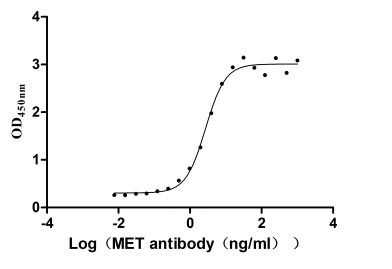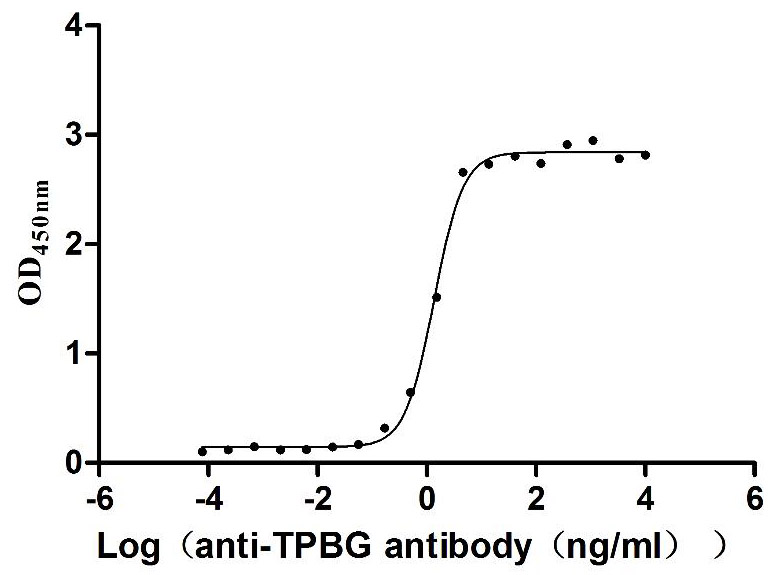Recombinant Human WD repeat and FYVE domain-containing protein 3 (WDFY3), partial
-
中文名稱:人WDFY3重組蛋白
-
貨號:CSB-YP809030HU
-
規(guī)格:
-
來源:Yeast
-
其他:
-
中文名稱:人WDFY3重組蛋白
-
貨號:CSB-EP809030HU
-
規(guī)格:
-
來源:E.coli
-
其他:
-
中文名稱:人WDFY3重組蛋白
-
貨號:CSB-EP809030HU-B
-
規(guī)格:
-
來源:E.coli
-
共軛:Avi-tag Biotinylated
E. coli biotin ligase (BirA) is highly specific in covalently attaching biotin to the 15 amino acid AviTag peptide. This recombinant protein was biotinylated in vivo by AviTag-BirA technology, which method is BriA catalyzes amide linkage between the biotin and the specific lysine of the AviTag.
-
其他:
-
中文名稱:人WDFY3重組蛋白
-
貨號:CSB-BP809030HU
-
規(guī)格:
-
來源:Baculovirus
-
其他:
-
中文名稱:人WDFY3重組蛋白
-
貨號:CSB-MP809030HU
-
規(guī)格:
-
來源:Mammalian cell
-
其他:
產(chǎn)品詳情
-
純度:>85% (SDS-PAGE)
-
基因名:WDFY3
-
Uniprot No.:
-
別名:WDFY3; KIAA0993; WD repeat and FYVE domain-containing protein 3; Autophagy-linked FYVE protein; Alfy
-
種屬:Homo sapiens (Human)
-
蛋白長度:Partial
-
蛋白標(biāo)簽:Tag?type?will?be?determined?during?the?manufacturing?process.
The tag type will be determined during production process. If you have specified tag type, please tell us and we will develop the specified tag preferentially. -
產(chǎn)品提供形式:Lyophilized powder
Note: We will preferentially ship the format that we have in stock, however, if you have any special requirement for the format, please remark your requirement when placing the order, we will prepare according to your demand. -
復(fù)溶:We recommend that this vial be briefly centrifuged prior to opening to bring the contents to the bottom. Please reconstitute protein in deionized sterile water to a concentration of 0.1-1.0 mg/mL.We recommend to add 5-50% of glycerol (final concentration) and aliquot for long-term storage at -20℃/-80℃. Our default final concentration of glycerol is 50%. Customers could use it as reference.
-
儲存條件:Store at -20°C/-80°C upon receipt, aliquoting is necessary for mutiple use. Avoid repeated freeze-thaw cycles.
-
保質(zhì)期:The shelf life is related to many factors, storage state, buffer ingredients, storage temperature and the stability of the protein itself.
Generally, the shelf life of liquid form is 6 months at -20°C/-80°C. The shelf life of lyophilized form is 12 months at -20°C/-80°C. -
貨期:Delivery time may differ from different purchasing way or location, please kindly consult your local distributors for specific delivery time.Note: All of our proteins are default shipped with normal blue ice packs, if you request to ship with dry ice, please communicate with us in advance and extra fees will be charged.
-
注意事項(xiàng):Repeated freezing and thawing is not recommended. Store working aliquots at 4°C for up to one week.
-
Datasheet :Please contact us to get it.
相關(guān)產(chǎn)品
靶點(diǎn)詳情
-
功能:Required for selective macroautophagy (aggrephagy). Acts as an adapter protein by linking specific proteins destined for degradation to the core autophagic machinery members, such as the ATG5-ATG12-ATG16L E3-like ligase, SQSTM1 and LC3. Along with p62/SQSTM1, involved in the formation and autophagic degradation of cytoplasmic ubiquitin-containing inclusions (p62 bodies, ALIS/aggresome-like induced structures). Along with SQSTM1, required to recruit ubiquitinated proteins to PML bodies in the nucleus. Important for normal brain development. Essential for the formation of axonal tracts throughout the brain and spinal cord, including the formation of the major forebrain commissures. Involved in the ability of neural cells to respond to guidance cues. Required for cortical neurons to respond to the trophic effects of netrin-1/NTN1. Regulates Wnt signaling through the removal of DVL3 aggregates, likely in an autophagy-dependent manner. This process may be important for the determination of brain size during embryonic development. May regulate osteoclastogenesis by acting on the TNFSF11/RANKL - TRAF6 pathway. After cytokinetic abscission, involved in midbody remnant degradation. In vitro strongly binds to phosphatidylinositol 3-phosphate (PtdIns3P).
-
基因功能參考文獻(xiàn):
- we demonstrate that normally ALFY attenuates the canonical Wnt signaling pathway via autophagy-dependent removal specifically of aggregates of DVL3 and not of Dvl1 or Dvl2. PMID: 27008544
- ALFY binds selectively to LC3C and the GABARAPs through a LC3-interacting region in its WD40 domain. PMID: 24668264
- increasing Alfy-mediated protein degradation may be beneficial in some organs, but may be detrimental in others PMID: 21150266
- Data suggest that p62 and ALFY interact to organize misfolded, ubiquitinated proteins into protein bodies that become degraded by autophagy. PMID: 20168092
- The selective macroautophagic degradation of aggregated proteins requires the PI3P-binding protein Alfy. PMID: 20417604
- Alfy might target cytosolic protein aggregates for autophagic degradation. PMID: 15292400
顯示更多
收起更多
-
相關(guān)疾病:Microcephaly 18, primary, autosomal dominant (MCPH18)
-
亞細(xì)胞定位:Nucleus membrane. Cytoplasm, cytosol. Nucleus, PML body. Membrane; Peripheral membrane protein; Cytoplasmic side. Perikaryon. Cell projection, axon.
-
組織特異性:Expressed in osteoclast and their mononuclear precursors (at protein level).
-
數(shù)據(jù)庫鏈接:
Most popular with customers
-
Recombinant Human Hepatocyte growth factor receptor (MET), partial (Active)
Express system: Mammalian cell
Species: Homo sapiens (Human)
-
Recombinant Human Tumor necrosis factor receptor superfamily member 11B (TNFRSF11B) (Active)
Express system: Mammalian cell
Species: Homo sapiens (Human)
-
Recombinant Macaca fascicularis Delta-like protein 3 (DLL3), partial (Active)
Express system: Mammalian cell
Species: Macaca fascicularis (Crab-eating macaque) (Cynomolgus monkey)
-
Recombinant Human Trophoblast glycoprotein (TPBG), partial (Active)
Express system: Mammalian cell
Species: Homo sapiens (Human)
-
Recombinant Human Dickkopf-related protein 1 (DKK1) (Active)
Express system: Mammalian cell
Species: Homo sapiens (Human)
-
Recombinant Human Alkaline phosphatase, germ cell type (ALPG) (Active)
Express system: Mammalian cell
Species: Homo sapiens (Human)
-
Recombinant Human Early activation antigen CD69 (CD69), partial (Active)
Express system: Mammalian cell
Species: Homo sapiens (Human)
-
Recombinant Human Cell adhesion molecule 1 (CADM1), partial (Active)
Express system: Mammalian cell
Species: Homo sapiens (Human)






-AC1.jpg)











